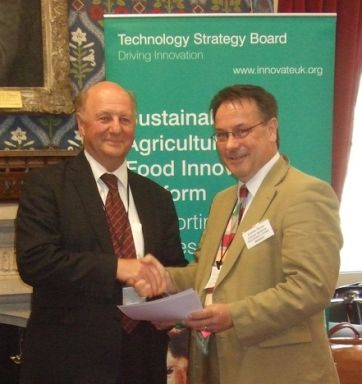Cellular Systems awarded TSB/ DEFRA research grants
18 July 2012
Nottingham BioCity-based Cellular Systems has been awarded grants for two research projects under the joint Technology Strategy Board / Defra “Innovation for Growth in Agriculture, Food and Drink” competition for funding.
The awards, worth £25,000 each, recognise Cellular Systems’ expertise in technology development across the food bioscience sector. The company was the only applicant from over 200 expressions of interest to be awarded two grants out of the total £500,000 competition funding allocated by the Technology Strategy Board and Defra.

Agriculture Minister James Paice MP (left)
congratulates Andrew Stacey
on the awarding of two TSB/Defra
feasibility grants.
Poultry disease detection
The first project, which starts in August, will look into measuring the passive detection of Campylobacter in poultry faeces. In the UK Campylobacter is believed to cause over 100 deaths a year and infects at least 600,000 people, far more than Salmonella or E. coli.
Working with Leeds based RoboScientific, the project will look at ways of passively monitoring and reducing the incidence of Campylobacter poisoning by positioning “electronic noses” in the roof space of poultry houses to ‘sniff-out’ and record the bacteria levels.
Cellular Systems Director Andrew Stacey says: “If we can demonstrate that this technology works, then it will lead to easier and more efficient scheduling in the slaughter house. This will reduce the incidence of Campylobacter infection and bring significant cost savings for the poultry industry and UK PLC.”
Collagen extraction
The second award of £25,000 is given for a project with Nottingham Trent University’s Professor Carole Perry, investigating the High Value products that can be extracted from egg shell waste. The egg processing industry in the UK produces and disposes of over 15,000 tonnes of waste every year, most of which goes to landfill at significant cost to the industry.
The project will seek to extract whole membranes of collagen from the shells which is estimated to be worth as much as £4,500/gm, which could be used in wound care. The global wound care market is currently worth £1.2 billion of which there is a significant sector for collagen-derived materials. Professor Perry and Cellular Systems will also investigate the extraction of calcium carbonate, which can be sold into industry at between £80-160 per tonne. This material has many industrial uses in the building, glass, landscaping, plastics, agriculture and medical sectors.
Andrew Stacey comments: “We have approached a number of Midlands-based egg producers who are interested in the feasibility work. What they now require is hard evidence, so this funding will take us much closer to providing both the scientific evidence and the future commercial opportunity.”
BioCity managing director Toby Reid is delighted that Cellular Systems has been singled out to receive this funding: “Andrew Stacey has worked long and hard with other partners to prove they have the innovative ideas to tackle some of our most pressing healthcare and environmental issues. I’m sure that the thorough research and rigorous scientific application will prove a success, and once more place Nottingham as a world-leader in bioscience innovation and commercialisation.”